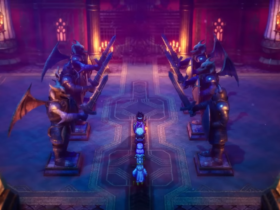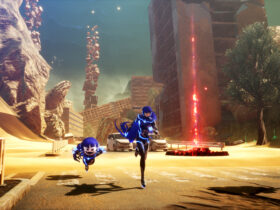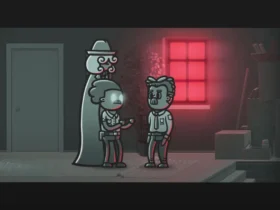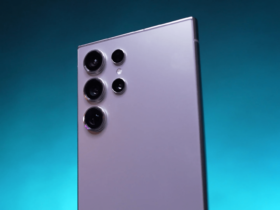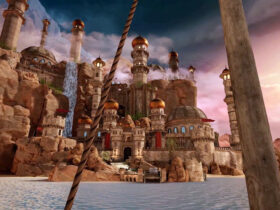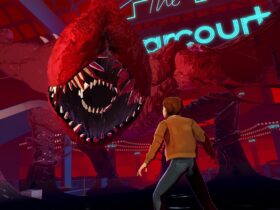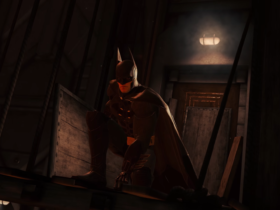We have already dealt several times of Private Eye. It is one of the most interesting cases of experience built around Oculus Rift and virtual reality, as described by the words of the developer “a psychological thriller film and, where voyeurism meets the mystery against the backdrop of a New York of 1950.” Intrigued by this premise, we decided to contact the creative director of the project, Jake Slack, who answered all of our questions and told us about the experience of developing in VR.
How did you get the idea for Private Eye?
The complete idea of Private Eye evolved quite organically. The original concept of building a game around spying on people through their windows was clearly inspired by the Film ‘Rear Window’ but also its derivitives such as Brian De Palma’s ‘Body Double’, ‘What Lies Beneath’, Disturbia etc. It’s an idea that works so well in film and so I thought the transition to game would also work well. I originally planned to make a mobile/tablet game but when the VR revolution came about it was such a perfect fit. The subsequent expansion of the game mechanics, the protagonists struggle and exploration of his own memories came after deep thought in a bath, my own personal Eureka moment!
Can you describe which kind of feeling will the players have while playing Private Eye?
I’m hoping we can deliver a real sense of presence to the player. We have made considerable effort visually, in design and control to up the feeling of presence. The body of the player is always completely in view, if you lean or move your body will also move with you. The settings we have used are real-world and relatable, everyone knows what it’s like to sit at a desk or be a passenger in a car driving along the road at night. The control scheme is purposely tactile and gives a connection to what the player is feeling through the controller to what the character does. We have also put in considerable effort to minimize standard game mechanics, for instance, if you inspect an object it doesn’t magically float in front of the player but the character actually reaches and grabs it and holds it physically.
How was your creative process influenced and changed by Oculus Rift, working on Private Eye?
I think this is sort of answered by the previous question and relates much to the idea of delivering presence but aside from that we wanted to create an exploration game that didn’t rely on moving around as we think this is something that breaks the sense of immersion. We knew we couldn’t create a full title from one stationary position and thus the idea of travelling into the character’s mind came around. This tied is quite nicely with having the player slowly unlock memories and together with the protagonist discover their own history. With first person VR you feel a stronger sense of becoming a character compared to traditional gaming but this introduces a problem as you know nothing about yourself, so it makes sense the character doesn’t either. You get to learn together.
[youtube id=”hbIzyqeeizI” width=”600″ height=”350″]
Which techniques did you use to create a sense of immersion in the user in Private Eye?
One of the core, conscious decisions was to replicate the predicament of the player with that of the character, you are both restricted in the sense you cannot get up and move. This physical replication of the character to the player helps up the sense of immersion. As stated we made sure the character’s body moves with the player and you don’t have the whole disembodied effect I have seen in quite a few titles that have a body but it remains static. Although currently not implemented we will be adding full binaural sound to the game add immersion in the sound sense. So we think we make good cases for sound, sight and touch – just need smell-o-vision to complete the set.
As a game developer, which are the things that you can do with virtual reality in Private Eye that you wouldn’t otherwise do?
I think it encourages you to think a little creatively and gives the freedom to take a few risks and try new things out. The control scheme in Private Eye for example is something that would never work with traditional games, it would just be way too intricate and fiddily but feels intuitive in VR (once you get used to it!). This is something that I wouldn’t have risked with a standard game – we all know the standard way to control a point and click and even if you found a new, interesting control scheme players have certain expectations and if these are challenged it could easily frustrate. It’s that creative journey in VR where the rules haven’t been written yet so I think player’s will be more open and willing to try new things out.

And, on the contrary, which are the obstacles and the challenges derived from virtual reality?
I’m going to have to unfortunately go with the infamous motion sickness – it can really turn a wonderful, beautiful experience into something you want to eject from immediately. It can be the barrier between someone wholly embracing VR or unequivocally denounce it. I think that Oculus really are doing a fantastic job and will do everything they can to minimize this effect and it will be up to us developers to create mindful games. We’ve seen with titles like Radial-G that if done right even lightening fast, frentic games that you would think would induce motion sickness can be designed and made in a way to minimize this effect.
Which games do you think are best suitable for the Oculus Rift?
We really think that narrative driven experiences that have a cinematic feel to them will be the most effective. I think any title that can really nail the sense of presence, either through the connection to their avatar or through a beautifully imagined environment, no matter what the genre will do well. I think this should be the starting point for most games.
Do you think that VR games are going to become as popular as traditional games in the future?
I think there will be a huge amount of uptake and I think we are going to see some genuinely fantastic games that have the quality and longevity to match traditional games. This will be the difference between VR and the other ‘next-big-thing’ movements like Kinect, Wii and 3D that ultimately didn’t deliver.

What is your dream project for the Oculus Rift?
I think character interaction in particular could be extremely intereting and something I would like to explore in the future. I think a project with the attention to detail on characters from the likes of Heavy Rain and LA Noire coupled with the ever shifting narrative direction of the Telltale games would be great. I think a project that delivered ultimate presence and a real sense of empathy to virtual characters coupled with a non-linear, procedural narrative shaped by your choices/personality would be amazing.
Which future do you see for virtual reality? Do you think is something that can change the way people live? If yes, how?
I hope it will be taken up as more as an entertainment device like a games console or television and is something that people spend only a small amount of time enjoying. That’s not to say the experiences couldn’t change the way your live – films, music, art etc have the ability to change the way one sees the world and I don’t see why a Virtual Reality experience couldn’t do the same. I wouldn’t however like to see VR replacing experiences that people would traditional do in the company of each other such as schooling, TV, outdoor activities, social interaction etc.







